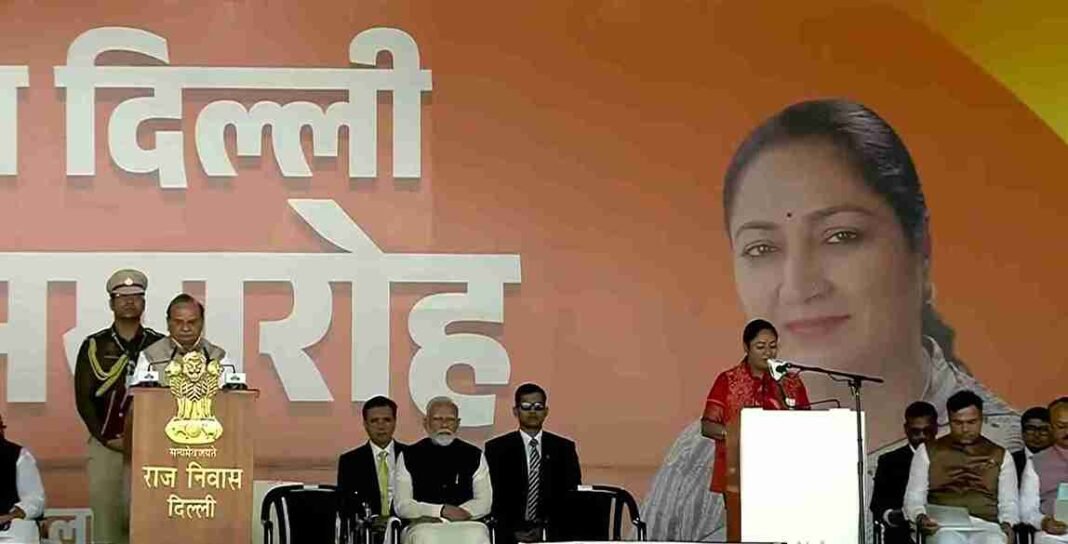Rekha Gupta of the Bharatiya Janata Party (BJP) was sworn in as the Chief Minister of Delhi on Thursday afternoon. The oath-taking ceremony took place at the iconic Ramlila Maidan, marking a historic moment for the party and the capital.
Gupta’s appointment makes her the BJP’s fourth Chief Minister in Delhi and the second woman to hold the position, following in the footsteps of Sushma Swaraj. She is also the fourth woman overall to serve as Chief Minister of Delhi, succeeding Atishi of the Aam Aadmi Party (AAP) and Sheila Dikshit of the Congress.
The ceremony was attended by prominent figures, including Prime Minister Narendra Modi, Home Minister Amit Shah, and BJP President JP Nadda, alongside chief ministers from BJP-ruled states and allies, such as N Chandrababu Naidu from Andhra Pradesh. The event underscored the BJP’s strong presence and influence in Indian politics.
Rekha Gupta, a first-time Member of the Legislative Assembly (MLA) representing Shalimar Bagh, secured her seat by defeating the AAP’s Bandana Kumari, who had held the constituency since 2013. Her selection as Chief Minister came as a surprise to many, especially given the high-profile candidates within the party.
Among those sworn in alongside Gupta were six of her party colleagues, including Parvesh Verma, who gained notoriety for defeating AAP leader Arvind Kejriwal in the New Delhi constituency. Verma was seen as a strong contender for the Chief Minister’s role but ultimately took the oath as a cabinet minister, being sworn in second after Gupta.
The new cabinet also includes Kapil Sharma, Manjinder Sirsa, Ashish Sood, Pankaj Kumar Singh, and Ravinder Indraj Singh, with the possibility of three additional ministers to be appointed in the future. The BJP has also nominated former Leader of the Opposition, Vijender Gupta, as the new Speaker of the Delhi Assembly. This marks a return for Gupta, who was previously evicted from the Assembly a decade ago during a confrontation with AAP members.
The confirmation of Rekha Gupta’s appointment followed a series of meetings held by the BJP’s Parliamentary Board, chaired by Prime Minister Modi. These discussions were delayed for nearly two weeks after the election results, as the party awaited Modi’s return from international trips to France and the United States.
In her inaugural address, Gupta expressed her commitment to elevating Delhi to new heights. She pledged to work with “full honesty, integrity, and dedication” for the welfare and empowerment of all citizens in the capital. Gupta also extended her gratitude to Prime Minister Modi and the BJP leadership for their trust in her capabilities.
The BJP’s victory in the recent elections and Gupta’s subsequent appointment as Chief Minister signal a shift in Delhi’s political landscape, which has been dominated by the AAP in recent years. The party’s strategy and Gupta’s leadership will be closely watched as they navigate the challenges ahead, including governance, public services, and addressing the needs of Delhi’s diverse population.
As the new administration takes shape, the focus will be on fulfilling the promises made during the campaign and ensuring that the aspirations of Delhi’s residents are met. With a fresh leadership team in place, the BJP aims to consolidate its position in the capital and deliver on its vision for the future of Delhi.








